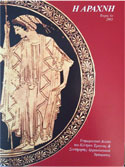May's word: The shearing of the sheep

From May and until July, depending on the region and the climate takes place the process of the shearing of the sheep. This is not only for the wool, but also for the health of the animals, in order for them to bear the hot summer sun.
The verbs used in Antiquity are three:
ΚΕΙΡΩ, ΠΕΚΩ, ΤΙΛΛΩ
1. The linguistic family of κείρω “to cut, to share” is very widely spread both in the Old-Indoeuropean and the Greek language. The present probably derives from a past perfect ἔκερσα> *κέρσωή *κέρσ-yω.
- Some remarkable derivatives of κείρω: κέρμα (coin), κορμός (trunk), καρτός (shaven), κάρθρα (salary of the sheep shearer), κουρά (shearing).
“χλανὶς καρτὴ ἄγραφος παράβολον ἔχο[υσα]·
παιδίου χλανίσκιον λευκόν καρτόν” (IG II2 39 επ.). The χλανὶς and χλανίσκιον are καρτά, shaved (Hesychius); the threads are cut, in contrast with other, thicker garments.
The later term κάρθρα (Edit of Diocletian) or κάρτρα (papyri) is the salary of the person shearing the sheep.
Expression: ὁ κεκαρμένος ἐν χρῷ, buzz cut, skinhead.
- The termκουρά, from the o-grade radical of κείρω, κορσ-, the cutting of heir, beard, animal hair.
From κουρά, there is a variety of derivatives, indicatively:
Κουρεύς, κουρεῖον, the hairdresser and his shop, the same terms are used today in Modern Greek. From the same root also the verb κουράζω, to tire.
Κουρίας, someone with very short hair.
Κουρίς –ίδος, (μάχαιρα) κουρίς, scissors used for shearing of sheep (Cratinus). Different meaning, the female hairdresser, κομμώτρια, as today.
Κούρειον, offering of the wool of a sheep the third day of the festival of Apatouria, called Koureotis (Κουρεώτις). The Apatouria Festival was celebrated from all Ionian tribes and the Athenians, during the month of Pyanepsion. At this Festival, little boys were presented for registration at their phratry, offering a tuft of their hair.
2. Τίλλω < τίλ-yω. Yet there is no certain etymology for τίλλω, nor for τίλοι, from which it may have derived. Perhaps from πτίλον (wing), with dissimulation of /π/ in composite with ἀπο- περι- παρα- etc., e.g. ἀπο-πτίλλω> ἀπο-τίλλω. It means “pluck, pull out” hair, beard (τιλλοπώγων). It is found in Homer, rare in the Attic dialect.
Τίλοι, the hair of the eyebrows. Τα τίλα, tufts of hair.
Νακότιλτος, with the wool plucked off (νάκη). Νακοτίλτης, wool plucker, shearer.
Τίλτρον (papyri), see supra, κάρτρα.
Παρατίλτρια, slave who epilates her mistress.
III. Πέκω < ΠΙΕ *pek-e/o (to comb, shear wool), from which:
πόκος (wool in its raw state, fleece), since Homer, as well as πέκω; Modern Greek ποκάρι (already since the 3d c. AD, ποκάριον).
Later term πέκος (wool), see also Lat. pecus -oris, «herd of small animals» (from which pecunia «money»).
Remarkable composite and derivatives: πόκυφος (wool weaver), εἰροπόκος, ποκάδες (tufts of wool), Myc. pekitira2 πέκτρια (wool comber), πέκτω with the dental, like the Lat. pecto and pecten. From the same radical also the comb, as well as the weaving comb, κτείς, κτήν –ενός, κτένιον, Modern Greek χτένα, κτενίζω (to comb), κτενιστής. (Radical *pḱtén-s in zero-grade with dissimulation of the initial /p/).


